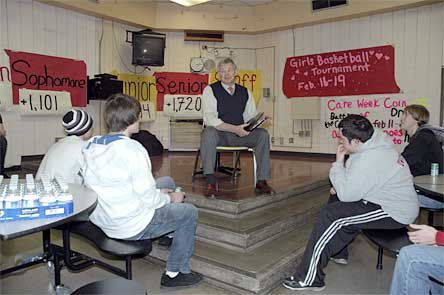MARYSVILLE — Rotarians, teachers and fellow students teamed up to sell Marysville-Pilchuck High School students on the real-world benefits of academic achievement Feb. 18.
Half a dozen student mentors shared pizza and healthy drinks with nearly a dozen student mentorees, as Steve Fulton introduced fellow Marysville Rotary Club members Tom Albright, Larry Trivett and Gayl Spilman. Fulton then explained how a high school student’s GPA can affect their prospects outside of the classroom.
“Auto insurers tend to offer lower rates to students whose GPAs are 3.0 or above, because if you respect the rules of your school, it’s more likely that you’ll respect the rules of the road,” Fulton said. “Also, if you’re making less than a 3.0, you’re less likely to be a supervisor as an adult than you are to be working for those who did get GPAs of 3.0 or above.”
Fulton asserted that the biggest problem facing the students in the room was not their school buildings, faculty members, curricula or even their own aptitudes, all of which he deemed good. Rather, he told the students their biggest problem was their own levels of motivation which he hoped to help correct with events such as the Rotary Business Week.
“If you apply yourselves, and spread the word among your friends about the keys to success that we’ve passed on, we can meet you halfway,” Fulton said.
Kris Mikesell, School for the Entrepreneur teacher and Future Business Leaders of America advisor, introduced the six student mentors and asked them to share their successful habits. Junior Rosa Chavez spends lots of time studying, and like organized senior Kevin Roberts, she makes sure to turn assignments in on time. Spencer Wilcoxson not only does his homework, but makes sure he understood his assignments, while focused fellow junior Meghan O’Brien tries to complete as much work in class as possible. Brendan Smith always aims for an “A,” no matter how hard it is, and fellow sophomore Sam Eastman tries to make every lesson interesting for himself. Fulton noted that effective time management is key in all these approaches.
Mikesell then supervised the exchange of contact information between the mentors and their mentorees, emphasizing that she must be included in all such correspondence to ensure that it’s appropriate.
“These are good, ethical kids who already shine on their own, and they want to help other students do the same. It’s student-to-student role modeling, that gives the mentorees peer pressure to do well,” Mikesell said.


